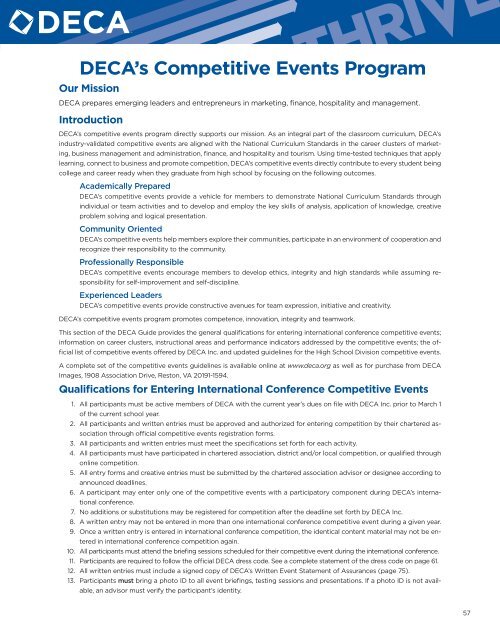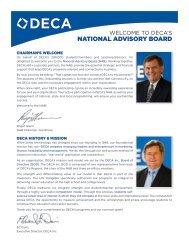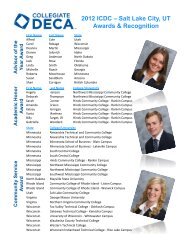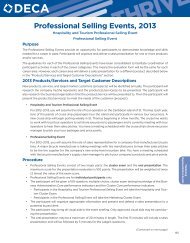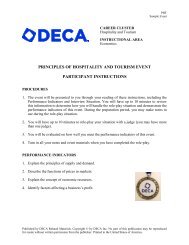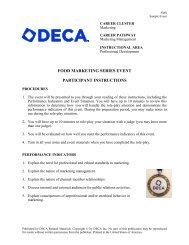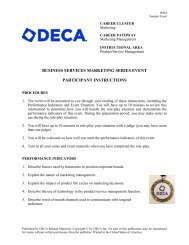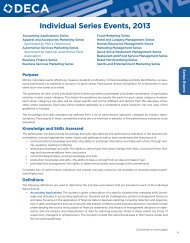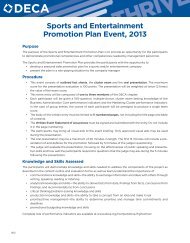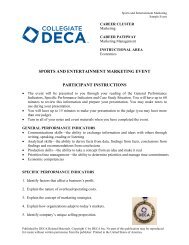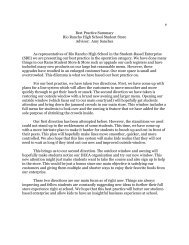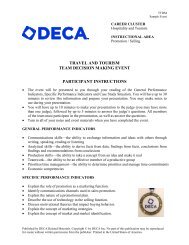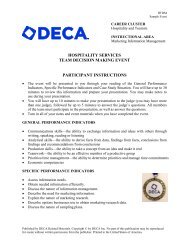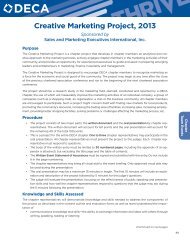DECA's Competitive Events Program
DECA's Competitive Events Program
DECA's Competitive Events Program
Create successful ePaper yourself
Turn your PDF publications into a flip-book with our unique Google optimized e-Paper software.
DECA’s <strong>Competitive</strong> <strong>Events</strong> <strong>Program</strong><br />
Our Mission<br />
DECA prepares emerging leaders and entrepreneurs in marketing, finance, hospitality and management.<br />
Introduction<br />
DECA’s competitive events program directly supports our mission. As an integral part of the classroom curriculum, DECA’s<br />
industry-validated competitive events are aligned with the National Curriculum Standards in the career clusters of market-<br />
ing, business management and administration, finance, and hospitality and tourism. Using time-tested techniques that apply<br />
learning, connect to business and promote competition, DECA’s competitive events directly contribute to every student being<br />
college and career ready when they graduate from high school by focusing on the following outcomes.<br />
Academically Prepared<br />
DECA’s competitive events provide a vehicle for members to demonstrate National Curriculum Standards through<br />
individual or team activities and to develop and employ the key skills of analysis, application of knowledge, creative<br />
problem solving and logical presentation.<br />
Community Oriented<br />
DECA’s competitive events help members explore their communities, participate in an environment of cooperation and<br />
recognize their responsibility to the community.<br />
Professionally Responsible<br />
DECA’s competitive events encourage members to develop ethics, integrity and high standards while assuming re-<br />
sponsibility for self-improvement and self-discipline.<br />
Experienced Leaders<br />
DECA’s competitive events provide constructive avenues for team expression, initiative and creativity.<br />
DECA’s competitive events program promotes competence, innovation, integrity and teamwork.<br />
This section of the DECA Guide provides the general qualifications for entering international conference competitive events;<br />
information on career clusters, instructional areas and performance indicators addressed by the competitive events; the of-<br />
ficial list of competitive events offered by DECA Inc. and updated guidelines for the High School Division competitive events.<br />
A complete set of the competitive events guidelines is available online at www.deca.org as well as for purchase from DECA<br />
Images, 1908 Association Drive, Reston, VA 20191-1594.<br />
Qualifications for Entering International Conference <strong>Competitive</strong> <strong>Events</strong><br />
1. All participants must be active members of DECA with the current year’s dues on file with DECA Inc. prior to March 1<br />
of the current school year.<br />
2. All participants and written entries must be approved and authorized for entering competition by their chartered as-<br />
sociation through official competitive events registration forms.<br />
3. All participants and written entries must meet the specifications set forth for each activity.<br />
4. All participants must have participated in chartered association, district and/or local competition, or qualified through<br />
online competition.<br />
5. All entry forms and creative entries must be submitted by the chartered association advisor or designee according to<br />
announced deadlines.<br />
6. A participant may enter only one of the competitive events with a participatory component during DECA’s interna-<br />
tional conference.<br />
7. No additions or substitutions may be registered for competition after the deadline set forth by DECA Inc.<br />
8. A written entry may not be entered in more than one international conference competitive event during a given year.<br />
9. Once a written entry is entered in international conference competition, the identical content material may not be en-<br />
tered in international conference competition again.<br />
10. All participants must attend the briefing sessions scheduled for their competitive event during the international conference.<br />
11. Participants are required to follow the official DECA dress code. See a complete statement of the dress code on page 61.<br />
12. All written entries must include a signed copy of DECA’s Written Event Statement of Assurances (page 75).<br />
13. Participants must bring a photo ID to all event briefings, testing sessions and presentations. If a photo ID is not avail-<br />
able, an advisor must verify the participant’s identity.<br />
57
58<br />
Career Clusters and Instructional Areas<br />
DECA’s <strong>Competitive</strong> <strong>Events</strong> <strong>Program</strong> is aligned with National Curriculum Standards in the Marketing, Business Management<br />
and Administration, Finance, and Hospitality and Tourism career clusters.<br />
Performance indicators are the basis of the content of the cluster exams and content interviews, case studies and role-plays.<br />
Performance indicators are specific knowledge/skills categorized by instructional area.<br />
The Business Administration Core has twelve instructional areas with performance indicators. This core is the foundation for<br />
all of DECA’s competitive events.<br />
As events become more specialized, they are associated with a specific career cluster and then possibly a career pathway. At<br />
each level, content becomes more specialized. Each career cluster has its own unique instructional areas, each with perfor-<br />
mance indicators. Each pathway has specific performance indicators that represent groups of careers within a specific career<br />
cluster.<br />
The chart below shows instructional areas in the Business Administration Core and for each of the four Career Clusters, and<br />
career pathways within each of the four career clusters. Please refer to page 59 for the relationship between specific competi-<br />
tive events and the Business Administration Core, Career Cluster and Pathways.<br />
Business Administration<br />
Core Instructional Areas<br />
Business Law<br />
Communication Skills<br />
Customer Relations<br />
Economics<br />
Emotional Intelligence<br />
Financial Analysis<br />
Human Resources Management<br />
Information Management<br />
Marketing<br />
Operations<br />
Professional Development<br />
Strategic Management<br />
Specialties Specialties Specialties Specialties<br />
Pathways Pathways Pathways Pathways<br />
Business Management<br />
and Administration Core<br />
Finance<br />
Cluster Core<br />
Marketing Career Cluster<br />
Instructional Areas<br />
Channel Management<br />
Marketing-Information Management<br />
Market Planning<br />
Pricing<br />
Product/Service Management<br />
Promotion<br />
Selling<br />
Business Management and<br />
Administration Career Cluster<br />
Instructional Areas<br />
Knowledge Management<br />
Project Management<br />
Quality Management<br />
Risk Management<br />
Finance Career Cluster<br />
Instructional Areas<br />
Compliance<br />
Financial-Information Management<br />
Product/Service Management<br />
Risk Management<br />
Hospitality and Tourism<br />
Cluster Core<br />
Hospitality and Tourism<br />
Career Cluster Instructional Areas<br />
Distribution/Channel Management<br />
Marketing-Information Management<br />
Market Planning<br />
Pricing<br />
Product/Service Management<br />
Promotion<br />
Selling<br />
Marketing<br />
Cluster Core<br />
Business Administration Core<br />
Business Law • Communication Skills • Customer Relations • Economics • Emotional Intelligence • Financial Analysis<br />
Human Resources Management • Information Management • Marketing • Operations • Professional Development • Strategic Management<br />
Marketing Pathways<br />
Marketing Communications<br />
Marketing Management<br />
Marketing Research<br />
Merchandising<br />
Professional Selling<br />
Business Management and<br />
Administration Pathways<br />
Administrative Services<br />
Business Information Management<br />
Corporate/General Management<br />
Human Resources Management<br />
Operations Management<br />
Finance Pathways<br />
Accounting<br />
Banking Services<br />
Corporate Finance<br />
Insurance<br />
Securities and Investments<br />
Hospitality and Tourism Pathways<br />
Lodging<br />
Recreation, Amusements, Attractions<br />
Restaurants and Food and Beverage Services<br />
Travel and Tourism
Performance Indicators<br />
Content Interviews, Role-plays and Case Studies<br />
• Performance indicators for Principles of Business Admin-<br />
istration content interviews will be selected from the busi-<br />
ness administration core.<br />
• Performance indicators for Team Decision Making case<br />
studies will be selected from the appropriate career clus-<br />
ter and the business administration core.<br />
• Performance indicators for Individual Series role-plays will<br />
be selected from the appropriate pathway, the appropriate<br />
career cluster and the business administration core.<br />
<strong>Competitive</strong> Event<br />
Business<br />
Admin.<br />
Core<br />
Career Cluster<br />
Exam<br />
Pathway<br />
Principles of Business Administration <strong>Events</strong><br />
Principles of Business Administration Exam<br />
Principles of Finance Exam<br />
Principles of Hospitality and Tourism Exam<br />
Principles of Marketing Exam<br />
Team Decision Making <strong>Events</strong><br />
Business Law and Ethics<br />
Specific performance indicator lists are available at www.deca.org/competitions/highschool/.<br />
•<br />
Business Management<br />
and Administration<br />
Buying and Merchandising • Marketing<br />
Financial Services • Finance<br />
Hospitality Services • Hospitality and Tourism<br />
Marketing Communications • Marketing<br />
Sports and Entertainment Marketing • Marketing<br />
Travel and Tourism • Hospitality and Tourism<br />
Individual Series <strong>Events</strong><br />
Accounting Applications • Finance Accounting<br />
Apparel and Accessories Marketing • Marketing Merchandising<br />
Automotive Services Marketing • Marketing Marketing Management<br />
Business Finance • Finance Corporate Finance<br />
Business Services Marketing • Marketing Marketing Management<br />
Food Marketing • Marketing Marketing Management<br />
Hotel and Lodging Management • Hospitality and Tourism Lodging<br />
Human Resources Management<br />
Business Management<br />
• and Administration<br />
Human Resources Management<br />
Marketing Management • Marketing Marketing Management<br />
Quick Serve Restaurant Management • Hospitality and Tourism Restaurant and Food and Beverage Service<br />
Restaurant and Food Service Management • Hospitality and Tourism Restaurant and Food and Beverage Service<br />
Retail Merchandising • Marketing Merchandising<br />
Sports and Entertainment Marketing • Marketing Marketing Management<br />
Marketing Representative <strong>Events</strong><br />
Advertising Campaign • Marketing<br />
Fashion Merchandising Promotion Plan • Marketing<br />
Sports and Entertainment Promotion Plan • Marketing<br />
Professional Selling <strong>Events</strong><br />
Hospitality and Tourism Professional Selling • Hospitality and Tourism<br />
Professional Selling • Marketing<br />
Career Cluster Exams<br />
• Performance indicators for the Principles of Business Ad-<br />
ministration exams will be selected from the business ad-<br />
ministration core.<br />
• Performance indicators for the four cluster exams used for<br />
Team Decision Making <strong>Events</strong>, Individual Series <strong>Events</strong>,<br />
Marketing Representative <strong>Events</strong> and Professional Selling<br />
<strong>Events</strong> will be selected from the appropriate career cluster<br />
and the business administration core.<br />
• Pathway performance indicators will not be used to de-<br />
velop any exam questions.<br />
59<br />
<strong>Competitive</strong> <strong>Events</strong><br />
Introduction
60<br />
Project Originality<br />
In many written events, chapters have settled on a strategy that uses the same well-developed projects year after year.<br />
Succeeding chapter teams often take the previous year’s successful project and seek to improve it. If that strategy works in<br />
achieving a chapter’s goals and the experience teaches the principles of DECA, the strategy serves the chapter, the commu-<br />
nity and DECA well.<br />
Chapters submitting entries for chapter team events, however, should be challenged to do more than update the previous<br />
year’s written project. Project committees should avoid even reviewing the previous year’s entry. Judges (whose assignment<br />
is to evaluate a project according to established guidelines) will be impressed by the originality of a chapter’s project. Plagia-<br />
rism of projects judged previously will automatically disqualify a chapter from competition and eligibility for awards.<br />
Judge Scoring<br />
Role-play Scoring. The judge will become familiar with all of the event guidelines before starting to evaluate the pre-<br />
sentation. A list of performance indicators specific to the scenario is included in the evaluation. These are distinct tasks the<br />
participants must accomplish during the content interview, role-play or case study. The judge will evaluate the participants’<br />
performance on these tasks and on several follow-up questions. The judge will complete the Presentation Evaluation Form.<br />
Written Event Scoring. The judge will become familiar with all of the event guidelines before starting to evaluate the writ-<br />
ten entry. Penalty points (see Written Entry Checklist) will have already been assessed. The Written Entry Evaluation Form<br />
follows the outline shown in the section entitled Format Guidelines for the Written Entry, which explains in greater detail what<br />
should be discussed/included in each section. The judge will complete the Written Entry Evaluation Form.<br />
A maximum score of “Exceeds Expectations” in any category means that, in the judge’s opinion, the information is presented<br />
effectively and creatively; nothing more could be expected of a participant.<br />
A “Meets Expectations” rating means that the information is presented well. Though there may be a few minor problems or<br />
omissions, they are not significant. Creativity, however, is not shown to any great degree.<br />
A “Below Expectations” score means that the information presented does not meet minimum standards of acceptability.<br />
A “Little/No Value” score means either that some major flaw has been noted that damages the effectiveness of the informa-<br />
tion (this may be a major omission, a serious misstatement, poor writing or any other major flaw) or that the information<br />
presented is of no value (does not address the problem at all).<br />
A combined total score of 70 or better on the written and presentation sections will earn the participant/team DECA’s Cer-<br />
tificate of Excellence at the international conference.<br />
Awards<br />
DECA’s competitive events provide recognition for competitors in a number of different areas. The following list describes<br />
the recognition provided:<br />
Certificate of Achievement: All competitors will receive a Certificate of Achievement recognizing the achievement necessary<br />
to qualify to participate in the International Career Development Conference.<br />
Certificate of Excellence: Competitors scoring a combined total score of 70 or better on the competitive event components<br />
will earn a Certificate of Excellence.<br />
Mini-Awards: For each event with career cluster exams, the highest ten individual scores on the career cluster exam will re-<br />
ceive a gold-ribbon medallion. For each Principles of Business Administration Event, Team Decision Making Event, Individual<br />
Series Event, Marketing Representative Event and Professional Selling Event, participants with top scores in each section of<br />
the interview component will each receive a gold-ribbon medallion. In all events, the top two overall scores in each section will<br />
be considered finalists and receive blue-ribbon medallions.<br />
Grand Awards: The top ten finalists will be called to the stage with first, second and third places receiving trophies and all ten<br />
receiving red-white-blue ribboned medallions.<br />
Cash Awards: All competitive event first place winners will receive a minimum of $100. Several events provide larger awards<br />
based on company sponsorship.


